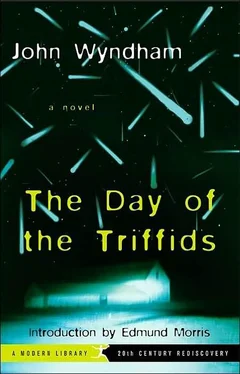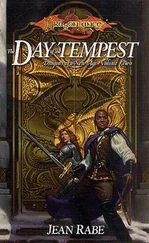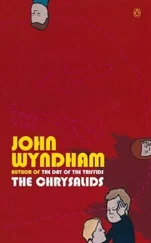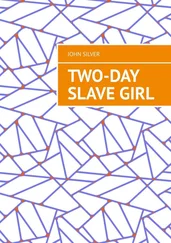We shook our heads.
He frowned a little. “That’s a pity. So far we’ve got no one
who does. It’ll surprise me if we’re not needing a doctor be-
fore long—and, anyway, we ought all of us to have inoculations… Still, it’s not much good sending you two off on a medical supplies scrounge. What about food and general stores? Suit you?”
He flipped through some pages on a clip, detached one of them and handed it to me. It was headed No. 15, and below was a typed list of canned goods, pots and pans, and some bedding.
“Not rigid,” he said, “but keep reasonably close to it and we’ll avoid too many duplications. Stick to best quality. With the food, concentrate on value for bulk—I mean, even if corn flakes are your leading passion in life, forget ‘em. I suggest you keep to warehouses and big wholesalers.” He took hack the list and scribbled two or three addresses on it.
“Cans and packets are your food line—don’t get led away by sacks of flour, for instance; there’s another part on that sort of stuff.” He looked thoughtfully at Josella. Heavyish work, I’m afraid, but it’s the most useful job we can give you at present. Do as much as you can before dark. There’ll be a general meeting and discussion here about nine-thirty this evening.”
As we turned to go:
“Got a pistol?” he asked.
“I didn’t think of it,” I admitted.
“Better—just in case. Quite effective simply fired into the air,” he said. He took two pistols from a drawer in the table and pushed them across. “Less messy than that.” he added, with a look at Josella’s handsome knife. “Good scrounging to you.”
Even by the time we set out after unloading the station wagon we found that there were still fewer people about than on the previous day. The ones that were showed an inclination to get on the sidewalks at the sound of the engine rather than to molest us.
The first truck to take our fancy proved useless, being filled with wooden cases too heavy for us to remove. Our next find was luckier—a five-tonner, almost new, and empty. We trans-shipped, and left the station wagon to its fate.
At the first address on my list the shutters of the loading bay were down, but they gave way without much difficulty to the persuasions of a crowbar from a neighboring shop and rolled up easily. Inside, we made a find. Three trucks stood backed up to the platform. One of them was fully loaded with cases of canned meat.
“Can you drive one of these things?” I asked Josella.
She looked at it.
“Well, I don’t see why not. The general idea’s the same, isn’t it? And there’s certainly no traffic problem.”
We decided to come back and fetch it later, and took the empty truck on to another warehouse, where we loaded in parcels of blankets, rugs, and quilts, and then went on farther to acquire a noisy miscellany of pots, pans, caldrons, and kettles. When we had the truck filled we felt we bad put in a good morning’s work on a job that was heavier than we had thought. We satisfied the appetite it had given us at a small pub hitherto untouched.
The mood which filled the business and commercial districts was gloomy—though it was a gloom that still had more the style of a normal Sunday or public holiday than of collapse. Very few people at all were to be seen in those parts. Had the catastrophe come by day, instead of by night after the workers had gone home, it would have been a hideously different scene.
When we had refreshed ourselves we collected the already loaded truck from the food warehouse and drove the two of them slowly and uneventfully back to the university. We parked them in the forecourt there and set off again. About six-thirty we returned once more with another pair of well-loaded trucks and a feeling of useful accomplishment.
Michael Beadley emerged from the building to inspect our contributions. He approved of it all save half a dozen cases that I had added to my second load.
“What are they?” he asked.
“Triffid guns, and bolts for them,” I told him.
He looked at me thoughtfully.
“Oh yes. You arrived with a lot of anti-triffid stuff,” he remarked.
“I think it’s likely we’ll need it,” I said.
He considered. I could see that I was being put down as a bit unsound on the subject of triffids. Most likely he was accounting for that by the bias my job might be expected to give—aggravated by a phobia resulting from my recent sting and wondering whether it might connote other, perhaps less harmless, unsoundnesses.
“Look here,” I suggested, “we’ve brought in four full truckloads between us. I just want enough space in one of them for these cases. If you think we cant spare that, I’ll go out and find a trailer, or another truck.”
“No, leave ‘em where they are. They don’t take a lot of room,” he decided.
We went into the building and had some tea at an improvised canteen which a pleasant-faced, middle-aged woman had competently set up there.
“He thinks.” I said to Josella, “that I’ve got a bee in my bonnet over triffids.”
“He’ll learn—I’m afraid,” she replied. “It’s queer that no one else seems to have seen them about.”
“These people have all been keeping pretty much to the center, so it’s not very surprising. After all, we’ve seen none ourselves today.’’
‘Do you think they’ll come right down here among the streets?”
“I couldn’t say. Maybe lost ones would.”
“How do you think they got loose?” she asked.
“If they worry’ at a stake hard enough and long enough, it’ll usually come in the end, The breakouts we used to get sometimes on the farms were usually due to their all crowding up against one section of the fence until it gave way.
“But couldn’t you make the fences stronger?”
We could have done, but we didn’t want them fixed quite permanently. It didn’t happen very often, ‘and when it did it was usually simply from one field to another, so we’d just drive them back and put up the fence again. I don’t think any of them will intentionally make this way. From a triffid point of view, a city must be much like a desert, so I should think they’ll be moving outward toward the open country on the whole. Have you ever used a triffid gun?” I added.
She shook her head.
After I’ve done something about these clothes, I was thin king of putting in a bit of practice, it you’d like to try,” I suggested.
I got back an hour or so later, feeling more suitably clad as a result of having infringed on her idea of a ski suit and heavy shoes, to find that she had changed into a becoming dress of spring green. We took a couple of the triffid guns and went out into the garden of Russell Square, close by. We had spent about half an hour snipping the topmost shoots off convenient bushes when a young woman in a brick-red lumber jacket and an elegant pair of green trousers strolled across the grass and leveled a small camera at us.
Who are you—the press?” inquired Josella.
“More or less,” said the young woman. “At least, I’m the official record. Elspeth Cary.”
“So soon?” I remarked. “I trace the hand of our order-conscious Colonel.”
“You’re quite right,” she agreed. She turned to look at Josella. “And you are Miss Playton. I’ve often wondered—”
Now look here,” interrupted Josella. “Why should the one static thing in a collapsing world be my reputation? Can’t we forget it?”
“Jim,” said Miss Cary thoughtfully. “Jib-huh.” She turned to another subject. “What’s all this about triffids?” she asked.
We told her.
“They think,” added Josella, “that Bill here is either scary or scatty on the subject.”
Читать дальше











